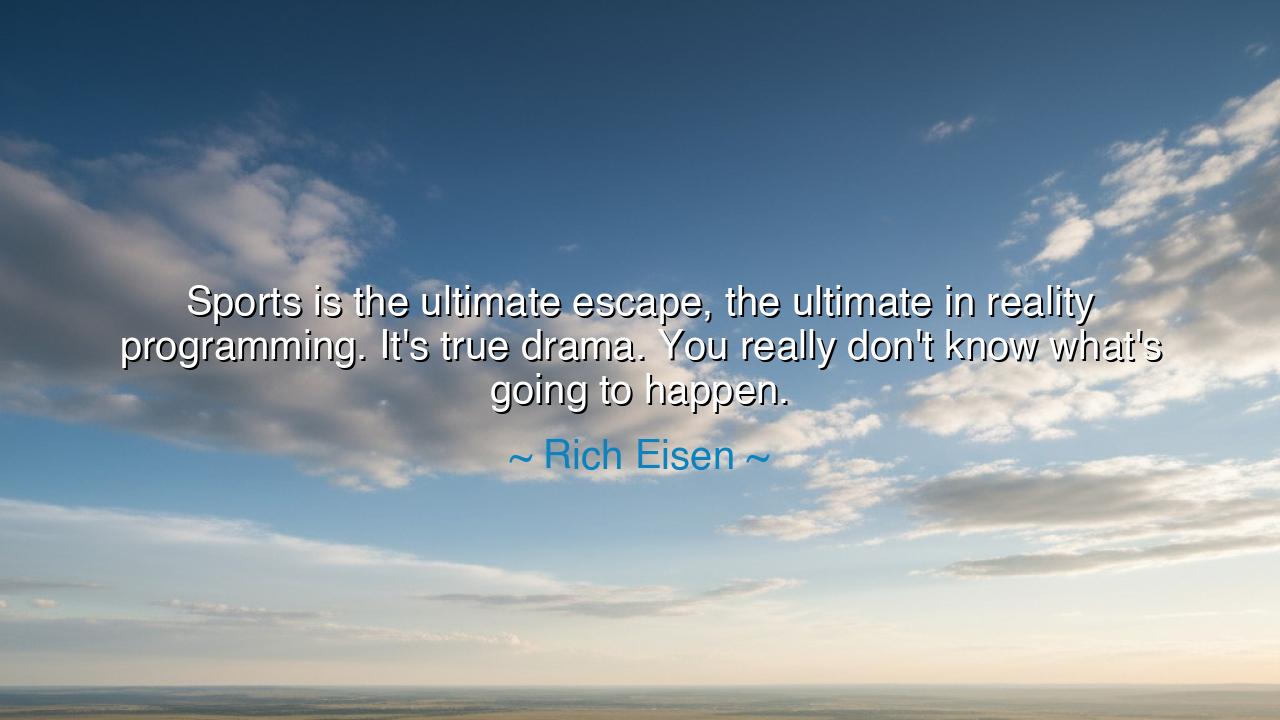
Sports is the ultimate escape, the ultimate in reality
Sports is the ultimate escape, the ultimate in reality programming. It's true drama. You really don't know what's going to happen.






The chronicler of games, Rich Eisen, once declared: “Sports is the ultimate escape, the ultimate in reality programming. It's true drama. You really don't know what's going to happen.” In these words we hear not merely the voice of a commentator, but the voice of an oracle speaking of the sacred place sports hold in human life. For sport is more than play—it is the weaving of destiny in real time, the collision of skill, will, and fate before the eyes of the world. Unlike the scripts of theater or the illusions of cinema, in sport the story is unwritten until the very breath of the final moment.
This quote speaks to the dual nature of sport: it is at once an escape from the burdens of daily life and a confrontation with the rawest form of reality. In the stadium or upon the screen, men and women lay bare their limits. There are no guarantees, no certain endings, no promises of triumph. The truth of sport is that it reflects the truth of life—uncertainty, struggle, heartbreak, and the possibility of glory. Thus, to watch sport is to witness the human spirit tested in its purest form, stripped of disguise.
Throughout history, this drama has captivated nations. Consider the 1969 “Miracle Mets,” a team once deemed hopeless, rising from obscurity to win the World Series. No writer could have scripted their improbable journey, yet millions lived the story as it unfolded before them. Or recall the tale of Jesse Owens at the 1936 Berlin Olympics, where a single runner, against the shadow of tyranny, defied prejudice and proclaimed through his speed the dignity of all mankind. These were not plays or fictions—they were living sagas, impossible to predict yet eternal once seen.
Even the ancients knew this truth. The Greek Olympics, held under the gaze of gods and men, were not only contests of strength but living dramas where the fates themselves seemed to intervene. Victories crowned heroes, defeats etched humility, and every contest revealed something of the human soul. The people gathered not only to see who would win, but to feel the raw uncertainty, the thrill of not knowing what the next heartbeat would bring. As Eisen reminds us, this unpredictability is what makes sport the truest form of drama.
The meaning of his words is that sport binds together escape and reality in a single vessel. We flee the mundane routines of life when we watch a game, yet what we see is life itself: courage, failure, sacrifice, resilience. Sport becomes both mirror and medicine, showing us what is possible while healing the heaviness of ordinary days. That is why the heart races when the score is tied, why strangers embrace in stadiums, why nations pause before a penalty kick or final lap—it is life distilled, fate revealed moment by moment.
The lesson we may take is that uncertainty is not an enemy but a gift. Just as sport thrills us because “you really don’t know what’s going to happen,” so too does life demand we embrace its unpredictability. We cannot script our days; we can only play them with all our strength, knowing that drama and meaning are born in the unknown. To live fully is to accept the game as it unfolds, to meet it with courage, as the athlete meets the arena.
Thus, Rich Eisen’s quote is not only about sport—it is about existence itself. He shows us that to love the game is to love the uncertainty of life, to embrace the unplanned, and to find meaning in the unfolding drama. Let us then walk through our days as athletes in the great contest, cherishing the suspense of the unknown, for it is in that uncertainty that life reveals its deepest beauty and its most enduring truths.






AAdministratorAdministrator
Welcome, honored guests. Please leave a comment, we will respond soon